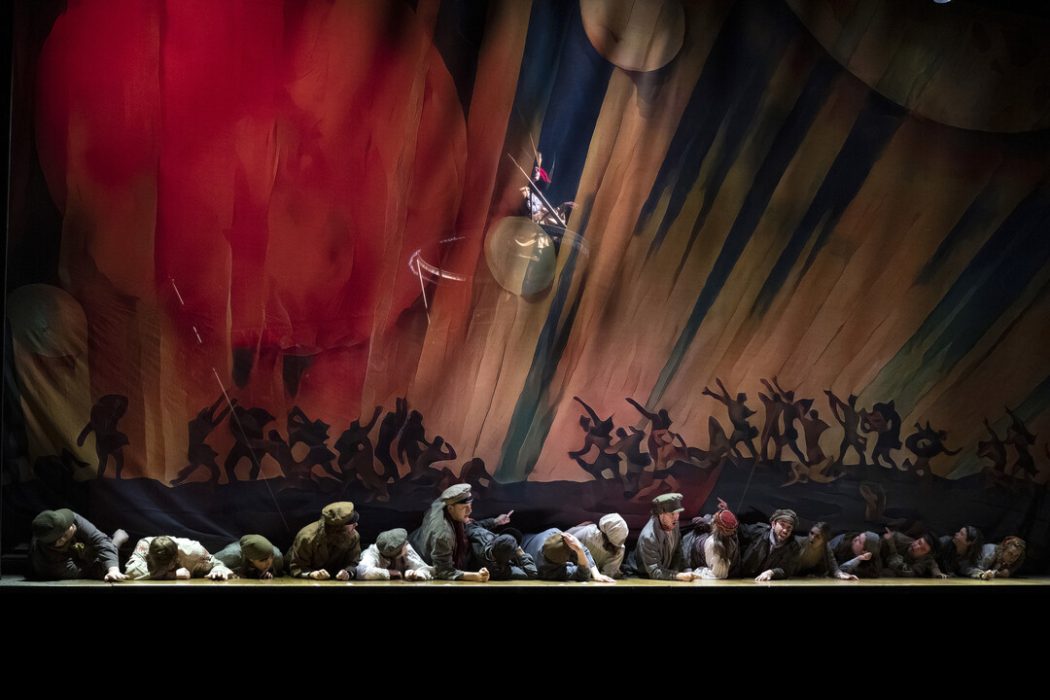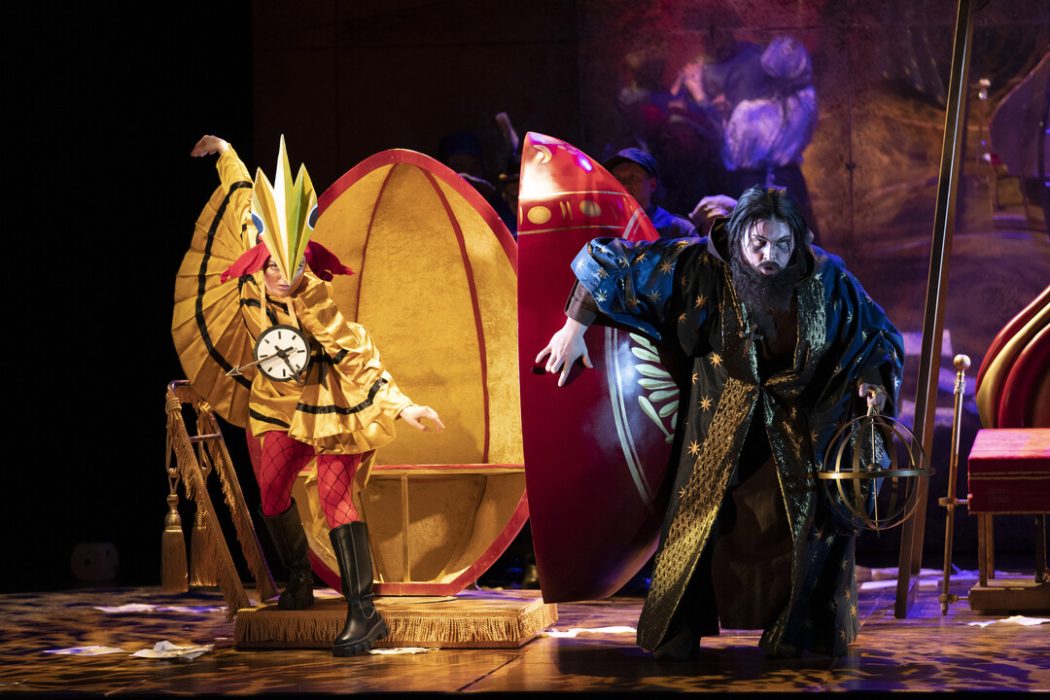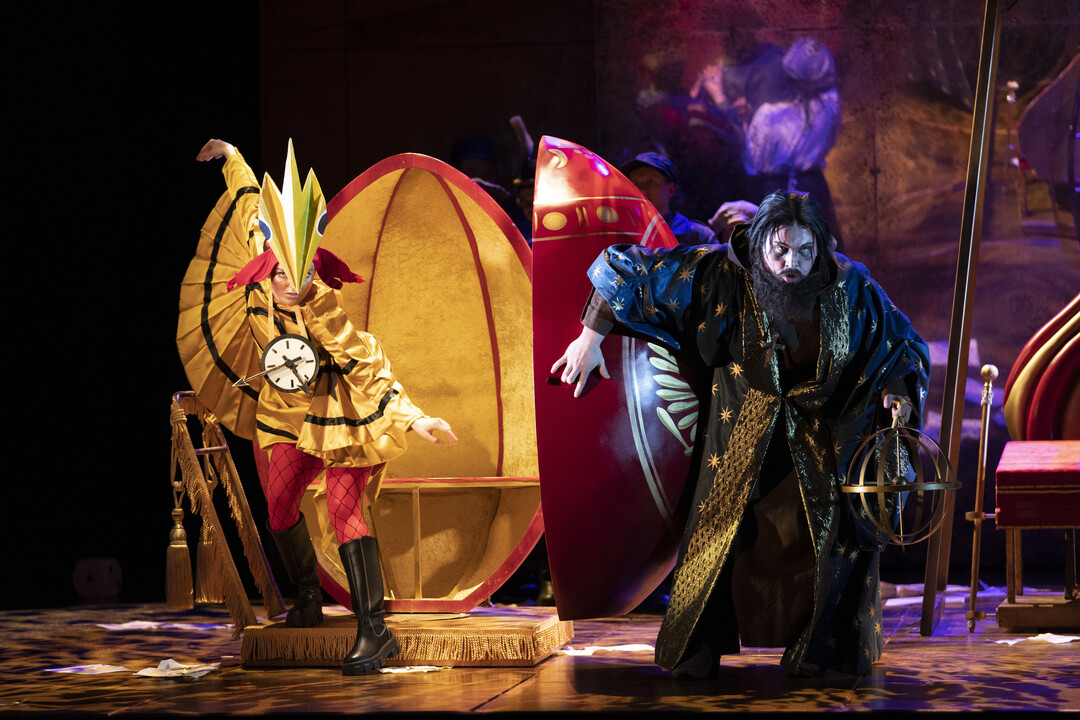A few weeks ago, one of my Russian friends shared pictures on his facebook page of government propaganda in central Moscow claiming that in the West Shostakovich and Chekhov are no longer performed. I was quick to assure him that this was entirely untrue. However, while Leningrad Symphonies and Seagulls would go entirely unquestioned by Putin and his friends, I don’t think they’d approve very much of English Touring Opera’s current production, despite it being by Rimsky-Korsakov, one of the great figures of Russian nationalist music and also a military officer, and based on a poem by Pushkin, the most revered Russian poet.
The Golden Cockerel is the story of a paranoid Tsar who picks a pointless fight with a neighbour and then sends in his army, who are so useless that the invasion becomes a debacle. The tragedy is that this opera could be set at so many times in Russian history; it’s a motif that chimes at terrible regularity throughout the centuries. My own response to the invasion of Ukraine was to re-read the excellent ‘Russia and the Russians’ by Geoffrey Hoskings. I found it extremely useful for giving me the bigger picture, and although it was written in 2001, its final chapters give some fascinating insights into the mentality of the current regime. But the other thing that struck me was the repeated tale of interference with neighbours and subsequent military failures. Russian national myths are built around their heroic responses to invasion – seeing off Napoleon and Hitler – and these overshadow the pointless destruction and humiliation of numerous military operations including the Crimean War, the Winter War in Finland at the beginning of World War II and more recently Afghanistan and Chechnya.
The particular war that Rimsky-Korsakov had in mind when he wrote the Golden Cockerel was the Russo-Japanese war of 1904-05, in which Russia sought to expand its influence in the Far East and establish an ice-free port on the Pacific and in doing so ended up at war with Japan. Things went badly from the start, with Japan destroying Russia’s Pacific fleet in a surprise attack, but Tsar Nicholas II persisted with the fight until the decisive Battle of Tsushima when replacement ships sent halfway round the world from the Baltic were annihilated.
The war caused huge dissatisfaction among the Russian people, and even before the final humiliating defeat, it had helped to spark the first Russian Revolution, in January 1905. Tsar Nicholas was forced to introduce some limited constitutional reforms, but quickly reneged on these. During the course of the 1905 uprisings, Rimsky-Korsakov was dismissed from his post at the St Petersburg Conservatory for supporting the rights of students to protest, and performances of his works were banned after a student production of his opera Kashchey the Immortal turned into a political protest. Students and professors resigned from the Conservatory in support of the composer, and he was briefly reinstated before finally retiring in 1906.

This then is the background against which Rimsky-Korsakov wrote his final opera The Golden Cockerel, which directly satirised the Russian monarchy and the war. Unsurprisingly, it didn’t get past the newly invigorated censors, and was not performed until 1909, the year after Rimsky-Korsakov died. At the end of the opera, the Astrologer, who is the evil power behind the throne, provoking the Tsar into his disastrous conflict, reveals that only he and the Tsarina are real, everything else is fiction, and reading the reviews, English Touring Opera have chosen to make explicit at this point that the Astrologer and Tsarina are in fact Rasputin and Nicholas’s wife Alexandra. The production also looks forward to the next disaster in Russian history, using using Bolshevik uniforms and a backdrop (pictured above) inspired by a famous painting of the early Soviet years, Konstantin Yuon’s ‘New Planet’.
I was quite surprised to discover, the original text by Pushkin doesn’t actually seem to have been written with any political significance, despite the fact that the poet frequently got himself into trouble with the authorities. It has the air of being a fairy tale, but isn’t quite, and in fact the twentieth century Russian poet Anna Akhmatova suggested that Pushkin’s inspiration came from a story by Washington Irving called ‘The Legend of the Arabian Astrologer’. ETO are performing it in English, with a rattling translation in witty rhyming couplets that is being compared to G&S by reviewers but which probably also captures the rhyming pattern of original Russian. The reviewers have also noted the slapstick energy of the production, which also sounds to me to be in keeping with Russian humour.
Touring opera productions don’t happen out of nowhere, so English Touring Opera are either very lucky or very prescient with their timing. While I’m greatly looking forward to both the musical and political content of this production though, it’s also reminding me how lucky we are because we can fearlessly mock the utter stupidity and banal cruelty of Putin and his army from our comfortable Western armchairs. While I’m at the Gala Theatre next week watching English Touring Opera, I’ll also be remembering my Russian friends, knowing that there is no way they would be allowed to see something like this at the moment.
English Touring Opera, The Golden Cockerel is at the Gala Theatre on Tuesday 10 May – details here
Photos: Durham alumna Alys Mererid Roberts as The Golden Cockerel and Robert Lewis as The Astrologer, and ETO’s Yuon inspired backdrop. Photo credit Robert Hubert Smith









